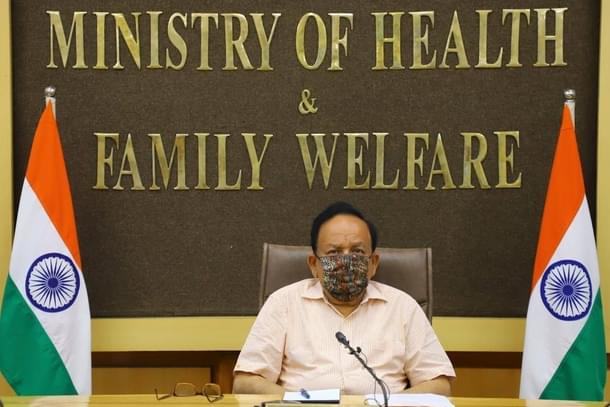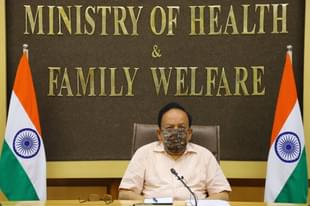Health
‘India Expanded Infra, Leveraged Technology To Fight Covid-19; Moving Towards Self-Reliance In Health Care’: Health Minister Dr Harsh Vardhan
Swarajya Staff
Jan 14, 2021, 09:00 PM | Updated 09:00 PM IST
Save & read from anywhere!
Bookmark stories for easy access on any device or the Swarajya app.


Addressing a webinar organised by Swarajya in association with Vedanta Resources Limited, Dr Harsh Vardhan, Union Minister of Health and Family Welfare, laid out his vision for India’s healthcare ecosystem in a post-Covid world.
Speaking at the event, the Minister stated that Prime Minister Narendra Modi’s call for an Aatmanirbhar Bharat is not a call for boycotting foreign goods. On the contrary, he said, a self-reliant India it is a call for development and innovation.
“.What we have in India, we must promote. What we don’t have in our country, we must innovate and make. What we can’t have an still need, we take from others, from anywhere across the globe,” the minister said, adding, “Swadeshi...should not be interpreted as isolation”.
“Definition of self-reliance has undergone a change in a globalised world. When a country talks about being self-reliant, it is different from being self-centered. Self-reliance will prepare the country for tough competition,” he added.
Dr. Harsh Vardhan said the government has eased norms for doing business to make India a hub for manufacturing and cutting edge research. It is working making the tax structures competitive, simplifying procedures and removing unnecessary regulations and placing enormous focus on technology, he added.
Dealing with Covid-19
Talking about healthcare, the minister said India had done well in managing the Covid-19 pandemic. India, he said, has managed the pandemic better than many other countries despite multiple constraints, including a large population.
“India accounts for only 2.4 per cent of world land mass and yet it supports and sustains 16.9 per cent of the world’s population. Across the world, after the pandemic raised its ugly head, people thought with high density of pop and resource constraints and poor infra we’ll be worst affected. And yet, we proved the world wrong. We had amongst the lowest mortality rate,” the Minister said.
The Minister said that India had one of the lowest mortality rates in the world, adding that the government understood the highly infectious nature of the disease and the need to ensure overall healthcare availability across the country.
To achieve this, he said, the Narendra Modi government did a strategic re-purposing of existing health infrastructure to ensure that the health systems providing primary healthcare at grassroots levels were left untouched.
The Minister called India’s response to Covid-19 “proactive and preemptive”, recalling that the first Covid-related advisory was issued by the Narendra Modi government as early as 17 January 2020 and thermal screening on incoming passengers from China and Hong Kong began on 18 January 2020.
Self-reliance in healthcare
Explaining how India used the Covid-19 pandemic to move towards self-reliance in healthcare, the minister said that the government utilized the time during lockdown to upgrade the health infrastructure, build the capacity of healthcare workers and ensure the availability of requisite logistics in the country.
“We are today self-sufficient in the indigenous manufacturing of PPE kits, masks etc and also in a position to export the same. From one lab in Pune, we now have more than ICMR-certified 2,323 labs,” the health minister added.
The Minister said that the Institute for Competitiveness, which is a global network of the Institute for Strategy and Competitiveness at Harvard Business School, has highlighted India’s success story of becoming the world’s second largest manufacturers of class 3 PPEs from being an importer.
Dr Harsh Vardhan also revealed that by the end of Unlock 6, the total number of isolation beds in the country increased to more than 1.5 million from only 10,180 before the lockdown and the number of Intensive Care Unit or ICU beds has increased to around 80,669 from just 2,168 before lockdown.
India also expanded its ventilator manufacturing capacity during the pandemic and achieved self-sufficiency in this critical field, the minister noted.
“Our premier institute, Indian Council for Medical Research, undertook a detailed exercise to upgrade our diagnostic capacity. As of 13 January 2021, that was yesterday, 326 RTPCR kits have been evaluated, of which 149 have been approved for use. Similarly, for antigen testing, 18 antigen-based rapid tests have been approved. For serological testing, 25 manufacturers of IGG Elisa kits have been approved. More than 1,600 domestic manufacturers of PPEs have cleared quality tests by now. More than 200 licenses have been issued by the Bureau of Indian Standard for the manufacturing of N95 masks,” the Health Minister said.
Both the vaccines which have received emergency use authorisation in India are being manufactured indigenously, he added.
Leveraging technology to fight Covid-19
The Health Minister underlined the critical role played by innovation and technology in fighting the Covid-19 pandemic. He said that the Aarogya Setu application, which was an important part of India’s test-track-trace and treat' strategy, has been downloaded by 168 million users.
“In order to aid the surveillance and containment activities, an IT tool called ITIHAS was also developed. 'eSanjeevani', a web-based comprehensive telemedicine solution is being utilized across India to extend the reach of specialized healthcare services to masses in both rural areas and isolated communities. ‘e-ICUs’ also provided round the clock guidance in managing ICU patients in peripheral settings,” the minister said.
Dr. Harsha Vardhan also talked about the Co-WIN, which is an indigenously developed digital platform for COVID-19 vaccination delivery.
“A National Expert Group on Vaccine Administration for COVID19, NEGVAC was constituted under the guidance of Hon’ble Prime Minister to monitor and decide on prioritization of population groups for vaccination, the delivery mechanism of the vaccine including tracking of the vaccination process and selection of delivery platforms,” the minister said during the webinar.
Pradhan Mantri Atmanirbhar Swasth Bharat Yojana
The minister said that a package of Rs 60,000 crore has been announced by the Prime Minister to strengthen the delivery of healthcare.
Under this package, he revealed, labs will be set up at the center, state, district and block levels. These labs will be integrated into a network for surveillance. The network will be backed by a robust IT architecture. This network will help in the detection, prevention and containment of disease outbreaks, he added.
“Development of critical care hospital blocks in more than 600 districts, as proposed under the scheme I mentioned, shall make such districts self-sufficient in providing comprehensive treatment for infectious diseases without disruption to other essential health services,” the minister noted.




